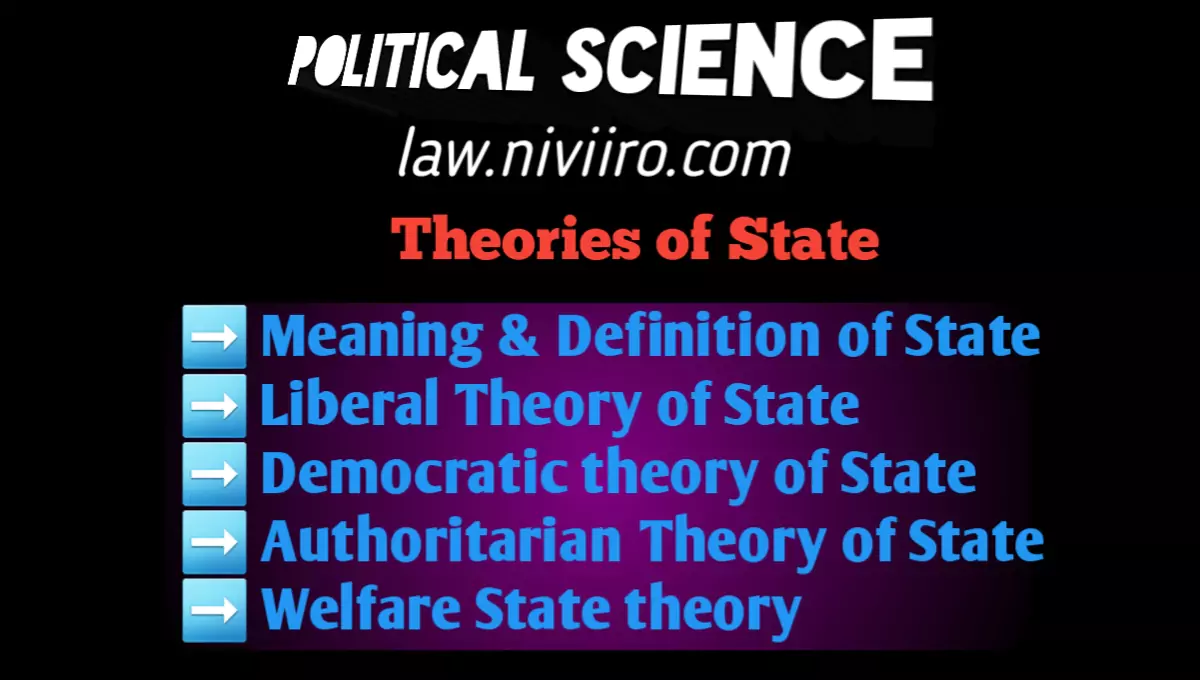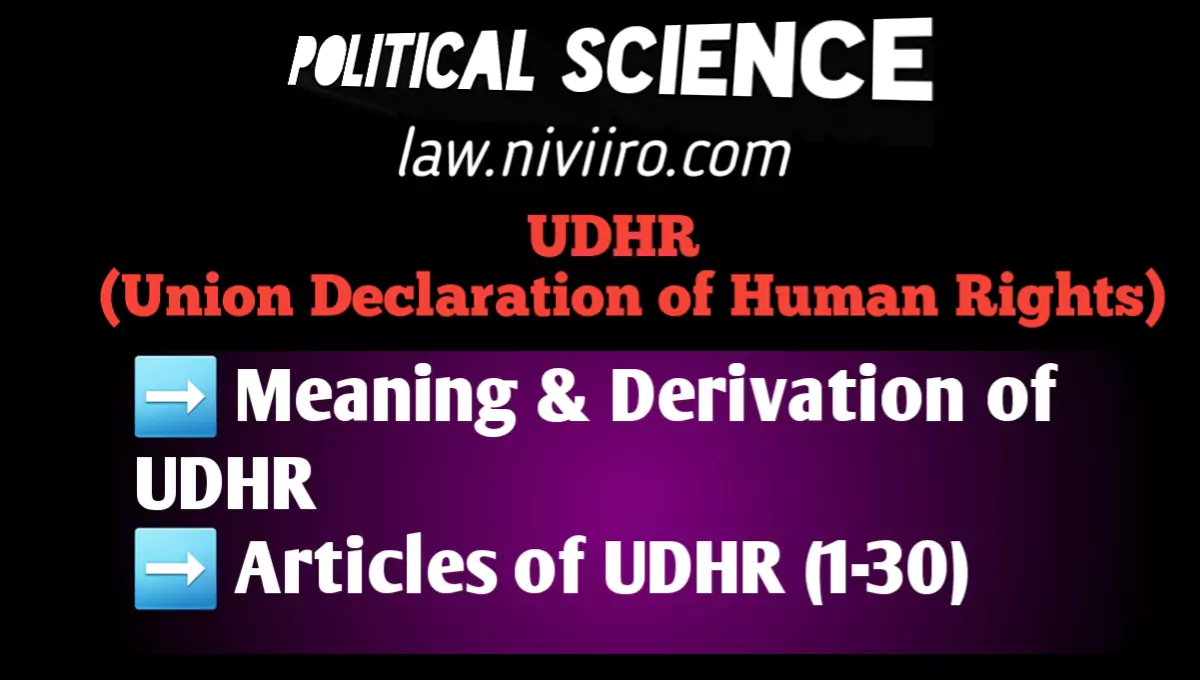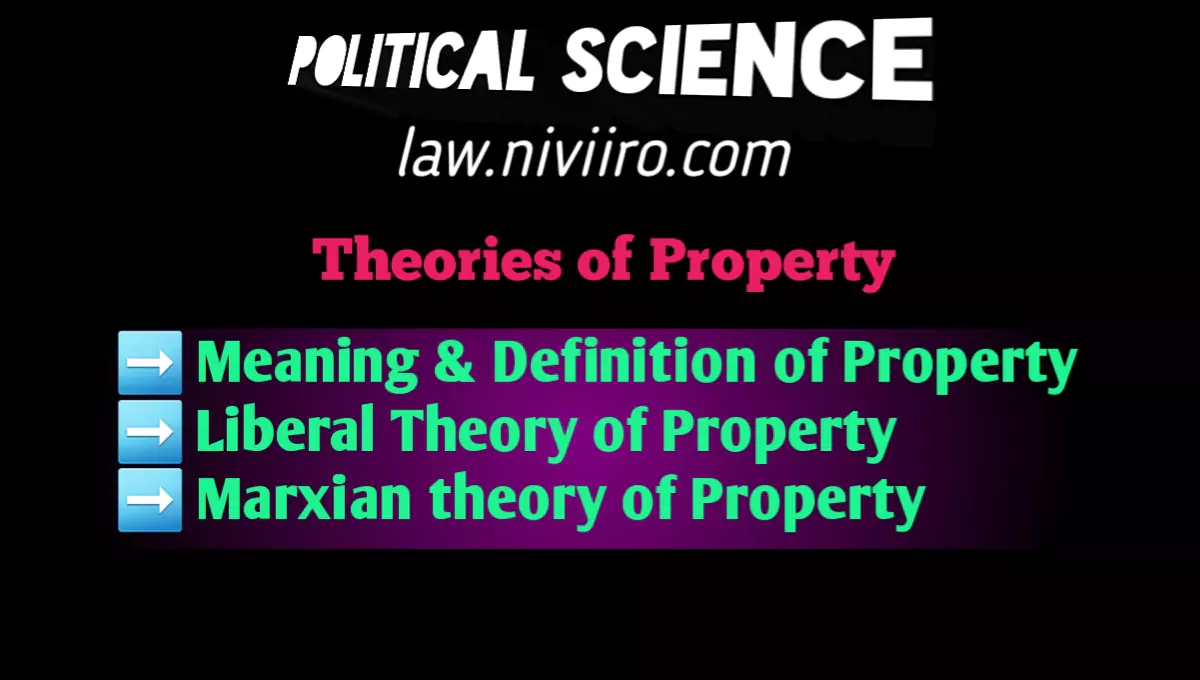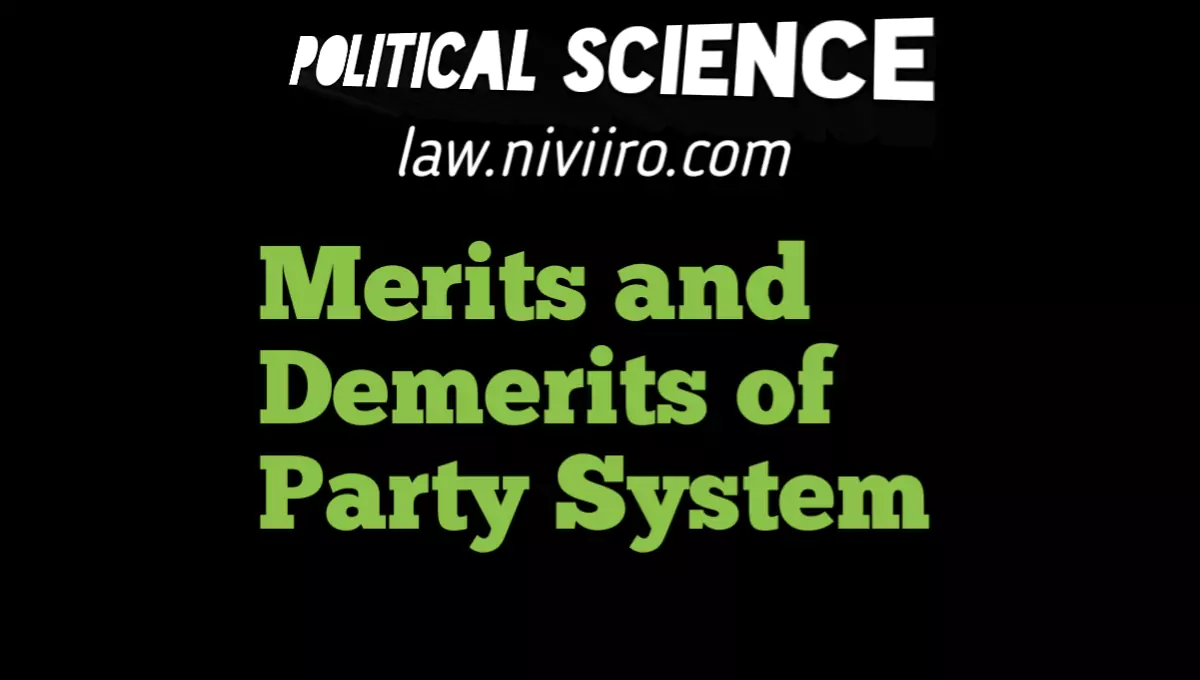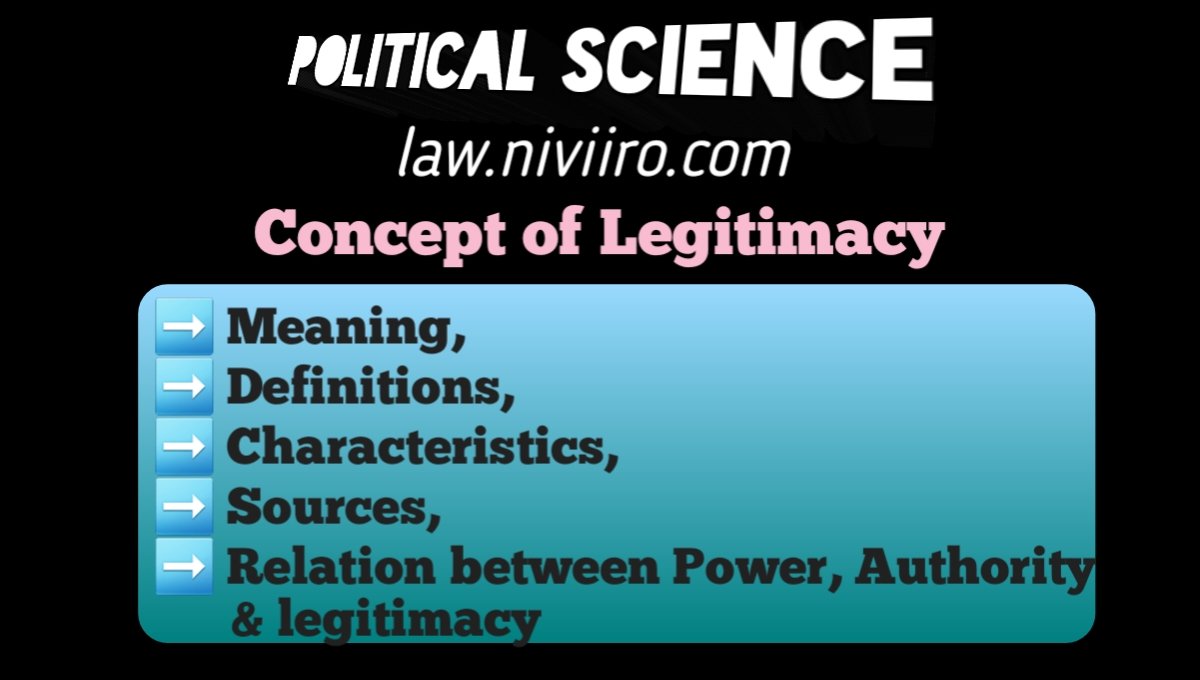Theories of State – The state is a political entity that has a monopoly on the legitimate use of force within a defined territory. It is an organized political community with a government that exercises sovereign power over the people within its jurisdiction.
Political Science is concerned with the State, the highest of all human relationships. The Greek term “polis” is most closely related to the English term “state.” “Polis” was the Greek name for “City States.” The phrase was appropriate because there were “city-states” in Greece at the time. “Political Science was largely municipal science for the Greeks,” explains Seeley. The Romans used the term “Civitas,” which meaning “city.” However, the term ‘civitas’ used by the Romans signified not only the concept of city citizenship but also the concept of public welfare.” The Teutons used the term “status,” which is merely part of a longer sentence.
The modern word “State” is derived from the word “status” used by the Teutons. Niccolo Machiavelli (1469-1527) is credited with coining the term “State” (State) in Political Science. He was the first to use this term in the modern political science literature. As a result, it is obvious that the term “State” did not become widely used until the sixteenth century. A large portion of Medieval Europe was unfamiliar with the concept of a modern state. Over time, the term “acquired the neutral sense of authority pure and simple or constitution whatever its principles or direction.”
Meaning and Definition of State
The term “State” has been defined by a number of political thinkers who tired their best to let us know what they meant by the term “State”. A few popular definitions are given below:
- According to Max Weber, the state is “a human community that (successfully) claims the monopoly of the legitimate use of physical force within a given territory.”
- According to political philosopher John Locke, the state is “a political society, consisting of a certain number of men, united together for the purpose of promoting their mutual safety and advantage, by means of their union.”
- Aristotle defined the state as “a union of families and villages having for its end a perfect and self-sufficing life by which we mean a happy and honourable life.”
- Burges defines the state as a “particular portion of mankind viewed as an organized unit.”
- According to Bluntschli, “The state is politically organized people of a definite territory.”
- According to Dr. Garner, “State as a concept of political science and public law, is a community of persons more or less numerous, permanently occupying a definite portion of territory, independent or nearly so, of external control and possessing an organized Government to which the great body of inhabitants render habitual obedience.”
- In 1576 Bodin defined the state as “an association of families and their common possessions, governed by supreme power and by reason.”
- Cicero defined the state as “a numerous society united by a common sense of right and a mutual participation in advantages.”?
- Professor Laski defined State as “a territorial society divided into government and subjects claiming within its allotted physical area, a supremacy over all other institutions.”
Theories of State
There are various theories of state, some of which we have discussed here:-
- Liberal theory of state
- Democratic theory of state
- Authoritarian theory of state
- Welfare state theory
Liberal Theory of State
The liberal theory of the state, commonly referred to as classical liberalism, is a political ideology that values free markets, limited government, and individual liberties. It is predicated on the idea that people are logical and self-interested, and that allowing them to pursue their own objectives will allow them to do so to the best of their abilities.
According to the liberal idea of the state, the state’s main duty is to defend its citizens’ individual rights. This covers the freedoms of speech, religion, and association as well as the rights to life, liberty, and property. The state is viewed as a necessary evil, but one whose authority and reach should be constrained in order to prevent it from endangering personal freedom.
Some liberal theorists, like John Locke and John Stuart Mill, believed that the government should support economic development and growth as well as create a stable and predictable environment for economic activity. However, they contend that the government shouldn’t participate directly in the market and shouldn’t make attempts to influence or manipulate economic results. Instead, the government should let people and companies engage in healthy competition and innovation and should only become involved in the economy when it’s required to safeguard the general welfare.
In order to prevent the misuse of power, the liberal conception of the state also supports a limited government and a system of checks and balances. It endorses the notion of a constitutional government, one in which the powers and restrictions of the state are stated in written constitution. Additionally, it emphasises the significance of free trade and markets, and it holds that these factors should rule the economy rather than government interference.
Ultimately, the liberal conception of the state aims to strike a balance between the necessity for a robust and efficient government and the need to safeguard personal autonomy and freedom.
Arguments in Favour
The liberal theory of the state has received a lot of support from many reasons and justifications. Here are a few illustrations:
- The liberal view of the state’s contribution to the framework for the protection of individual rights is one of its fundamental justifications. This perspective holds that the state has a duty to guarantee that people are free to pursue their own interests and make their own decisions without interference from the government or other outside influences.
- The liberal theory of the state also places a strong emphasis on the value of social stability and the rule of law. The state contributes to the development of a stable and peaceful society by defending individual rights and advancing a just and predictable legal system.
- A free market system is said to be the most effective and efficient way to allocate resources, according to the liberal conception of the state, which is frequently connected with free market capitalism. According to this perspective, a smaller, less intrusive government promotes economic growth by letting entrepreneurs operate freely.
- The liberal theory of the state also supports the restriction of state authority, believing that a more decentralised, smaller government is more responsive to public demands and less prone to misuse.
In overall, the liberal conception of the state aims to strike a balance between the necessity of a powerful and efficient government and the significance of upholding individual liberties and advancing a just and fair society.
Arguments in Against
While the liberal theory of the state has wide acceptance and has contributed to the growth of several contemporary democracies, it has also drawn criticism and objections from a variety of angles. Several criticisms of the liberal view of the state may be seen in the following examples:
- Some opponents contend that the liberal theory of the state is overly focused on individual rights and freedom and fails in addressing appropriately the problems of social and economic inequality. They contend that in order to address these problems and advance more equality, a more interventionist state is required.
- Some opponents contend that the liberal theory of the state minimises the significance of the state in forming society and fails to acknowledge the role that the state may play in fostering social and economic transformation.
- Some critics argue that the liberal theory of the state is too limited in its concentration on the nation-state and is unable to confront the complex global concerns of the contemporary world, such as climate change and transnational terrorism.
- Some critics argue that it fails to appropriately reflect the needs and concerns of marginalised or disadvantaged groups because it is overly focused on defending the interests of the affluent and powerful.
Overall, although having many supporters and having a considerable impact on contemporary democratic regimes, the liberal theory of the state is not without its detractors.
Democratic Theory of State
The democratic theory of the state holds that the legitimate authority of the state is derived from the consent of the governed. This means that the state has a responsibility to represent the will of the people and to act in their best interests. In a democracy, citizens have the right to take part in governmental decision-making through means like voting and representation. While emphasising the value of individual freedoms and rights, the democratic theory of the state also recognises the necessity to strike a balance between such rights and the requirements of the community.
Democratic views of the state are predicated on the notion that every person is equal and should have a equal voice in how the state is managed. In order to avoid the concentration of power in the hands of a select few people or organisations, they also understand the significance of checks and balances. The democratic theory of the state is founded on the idea that the people should have a voice in choices that impact their lives and that the government should be answerable to them.
The democratic conception of the state has been written about by a wide variety of authors, all with differing opinions. Here are a few illustrations:
The Enlightenment philosopher John Locke made a strong argument for the notion that the state should serve to safeguard citizens’ inherent rights to life, liberty, and property. According to Locke, the populace has the right to overthrow a government that does not uphold their rights.
Another philosopher of the Enlightenment, Jean-Jacques Rousseau, promoted the idea that in a democracy, the general will of the populace ought to be given supreme power. He held that a direct democracy should be used to give the people a direct say in the decisions that the government makes.
According to economist and philosopher John Stuart Mill, the finest type of governance is one that provides for the greatest degree of personal freedom and self-actualization. Although Mill supported majority rule, he also thought that minorities’ rights should be protected.
Robert Dahl, a modern political theorist, has suggested that democratic philosophy should be centred on promoting the inclusion of all members of society in the state’s decision-making processes. He believes that in order to ensure that the opinions of underprivileged or marginalised groups are taken into consideration, a state must have robust protections.
Arguments in Favour
The democratic conception of the state has been supported by a number of reasons, including the following:
- The foundation of democracy is the concept of popular sovereignty, which holds that the people are the source of the state’s ultimate power. As a result, citizens feel invested in and have a stake in their government’s actions.
- Democracy promotes accountability and transparency in government, as elected officials are held accountable to the people through regular elections and other mechanisms of democratic accountability.
- Conflicts may be settled peacefully in democracies, and minorities’ rights are protected. Rather than using force or coercion, decisions are decided in a democratic government through a process of dialogue and compromise.
- Democracy promotes political engagement and active citizenship, which can result in more informed and involved individuals.
- The free flow of ideas and the preservation of property rights are two further ways that democracy has been proved to support economic growth and stability.
Arguments in Against
The democratic conception of the state has been criticised for a number of reasons, including the following:
- Some contend that democracy is inherently inefficient and slow-moving since choices must first be reached by the majority in order to be made. In vast and varied cultures in particular, this can result in delays and bottlenecks.
- Critics argue that the media and special interest organisations, which have the power to sway elections and mould public opinion, may affect public opinion and weaken democracy.
- Some argue that the majority rule concept might result in the suppression of minority rights since the majority’s interests may not always coincide with those of minority groups.
- Critics argue that democracy can be unstable, as it relies on the ongoing consent of the governed. People may stop supporting their government or look for other kinds of administration if they lose trust in it or believe that their needs are not being served.
- Some critics argue that not all countries can benefit from democracy, especially those that are bitterly divided or have a troubled past. In these circumstances, alternative types of governance, such autocracy or anocracy, could be better able to keep peace and order.
Authoritarian Theory of State
The authoritarian theory of the state holds that the state is an entity that is distinct from society and has the legal authority to exert total dominance over its people. This thesis is founded on the notion that the government should be permitted to make choices on behalf of its citizens without interference or input from the general public since it knows what is best for them. The government has total authority over the nation’s political, social, and economic activities under an authoritarian state. Individual liberties and rights are frequently curtailed, and criticism of the government is not permitted.
A single monarch or a small group of leaders who exercise power without due process frequently controls authoritarian regimes. To keep population control, they may employ repression, censorship, and propaganda. The state should have total authority and its requirements should take precedence above peoples’ personal liberties and rights. This theory is frequently criticised for its disregard for individual liberties and for the possibility of power abuse on the part of people in positions of control.
The authoritarian theory of the state has been discussed by a wide range of writers, all of whose opinions are open to interpretation. Here are a few illustrations:
Greek philosopher Plato said that an aristocracy, in which a select few knowledgeable and upright people ruled over the others, was the greatest type of governance. According to Plato, kings should be philosophers who were motivated by virtue and reason rather than self-interest.
The philosopher Thomas Hobbes argued that the state’s role was to provide security and order in the face of disorder and anarchy. Hobbes thought that in order to preserve social order and safeguard the populace from one another, an absolute sovereign was required.
Political thinker Carl Schmitt argued that the state is an organisation that has the exclusive right to employ violence within a certain region. Schmitt thought that the rule of law should be secondary to the will of the sovereign and that the state’s power should be absolute and unquestioned.
More recently, political scientist Samuel Huntington has argued that because it enables the upkeep of order and stability in the face of social and economic problems, the authoritarian view of the state is better suited for countries that aren’t yet ready for democracy.
Arguments in Favour
A few justifications for the authoritarian conception of the state have been put forth:
- Some argue that an authoritarian administration may act swiftly and effectively without consultation with or input from the populace. When there is a need for immediate action or during a crisis, this can be especially helpful.
- Some argue that an authoritarian regime may bring peace and order, especially in nations with significant polarisation or a history of war. In these situations, it can be thought that maintaining peace and security requires a powerful, centralised government.
- Some proponents of the authoritarian conception of the state contend that because it is not subject to the same amount of political pressure as a democratic administration, it can be more successful at putting long-term planning and development programmes into action.
- Some contend that an authoritarian state is better able to put into effect social and economic measures that could be controversial in the short term but are advantageous in the long term.
It is significant to highlight that critics of the authoritarian view of the state frequently refute these claims, claiming that a lack of accountability and individual liberties can result in the misuse of power, which ultimately threatens the stability and well-being of society.
Arguments in Against
The authoritarian view of the state has been criticised for a number of reasons, including:
- The authoritarian state ideology is frequently criticised for its disregard for the liberties and rights of the person. The government has total control over the lives of its people under an authoritarian state, and personal freedom is frequently curtailed.
- As the authoritarian state depends on the ongoing support of a single leader or a small group of leaders, the authoritarian view of the state is said to be unstable by nature. The state may be susceptible to disintegration or turmoil if this support dwindles or the ruler loses popularity.
- Some contend that the absence of the checks and balances seen in democratic regimes renders the authoritarian view of the state ineffective. As a result, bad decisions may be made and persons in positions of authority may not be held responsible for their deeds.
- Those in charge may be able to behave without consequence and advance their own interests at the expense of the general populace if there is not adequate supervision and accountability.
- Critics charge that the principles of a contemporary, multicultural society cannot coexist with the authoritarian ideology of the state. It is frequently linked to oppression, censorship, and the stifling of dissent, all of which are viewed as being contradictory.
Welfare State Theory
The welfare state theory of State is based on the notion that the state has a duty to provide the needs and general welfare of its people. This involves ensuring that people have access to healthcare, education, and other social services as well as shielding them from adversity and economic uncertainty. The welfare state theory of the state contends that the state must protect the wellbeing of all members of society, not only the affluent or powerful, and is frequently linked to social democratic or socialist political philosophies.
In a welfare state, the state assumes a key role in the delivery of social services and the income redistribution through programmes like social security and progressive taxation. The welfare state seeks to advance social fairness and equality while making sure that every citizen has the chance to realise their full potential. In general, the welfare state view of the state is founded on the conviction that the state has an obligation to meet its inhabitants’ needs and advance the common good. Many people contend that this approach might inhibit individual initiative and self-sufficiency and can result in excessive amounts of taxes and an overreliance on the state.
The welfare state theory of the state is based on the idea that the state has a responsibility to provide for the welfare and well-being of its citizens. The welfare state theory of the state has been written about by a number of different writers, and these authors’ opinions can differ. Here are a few illustrations:
British economist and social reformer William Beveridge made the argument that the government had a duty to create a “safety net” for its people in order to shield them from the “great evils” of poverty, sickness, ignorance, and filth. Beveridge’s theories influenced the creation of the contemporary welfare state in the UK and other nations.
According to British sociologist T.H. Marshall, A contemporary democratic society must include the welfare state. He held the opinion that it is the duty of the state to make sure that all people have access to the opportunities and resources necessary to fully engage in society.
The distributive justice principle, which asserts that resources should be divided in a way that favours the least advantaged members of society, is one that the philosopher John Rawls believed should serve as the foundation for the welfare state. According to Rawls, the welfare state has a moral duty to support individuals who are unable to care for themselves.
Bruce Ackerman, a political theorist, has argued more recently that the welfare state should be viewed as a “partnership” between the government and its population. He contends that while it is the duty of the state to ensure the welfare of its people, it is also the obligation of the people to participate in politics in order to advance the common good.
Arguments in Favour
According to some authors, the following points support the welfare state view of the state:
- The welfare state, in the opinion of economist John Kenneth Galbraith, is required to overcome the inherent disparities and instability of a capitalist economy. In his view, the welfare state acts as a check on the excesses of capitalism by guaranteeing that everyone in society has access to needs like healthcare, education, and a safety net in times of need.
- According to political philosopher John Rawls, a fair society cannot exist without the welfare state. Regardless of their upbringing or circumstances, he thought that it is the duty of the state to provide all citizens with the chance to live respectable lives.
- The welfare state, according to sociologist T.H. Marshall, is a crucial component of contemporary industrialised societies. He believed that the welfare state contributes to social cohesiveness and ensures that everyone in society has a stake in the well-being of the community.
- The welfare state, according to economist Amartya Sen, is required to make sure that everyone in society has the chance to live a life of dignity and to reach their full potential. He believed that rather than only providing for fundamental needs, the welfare state should concentrate on creating possibilities and empowering persons to live satisfying lives.
- The basis of the welfare state theory is the concept that it is the duty of the state to ensure the wellbeing of its people. Access to fundamental requirements like healthcare, education, and social security is part of this.
- The welfare state, according to its proponents, aids in promoting social justice and reducing inequality. The welfare state aids in making sure that everyone in society has the chance to realise their full potential by offering a safety net for those who are underprivileged or in need.
- The welfare state idea of government is frequently viewed as a means of fostering social cohesion and stability. The welfare state can serve to lower the danger of social unrest and violence by providing a basic level of support for all residents.
- Some contend that the welfare state is a crucial instrument for promoting economic expansion and development. The state can produce a more effective and healthier workforce, which can stimulate economic growth, by making investments in education, healthcare, and social security.
- Proponents of the welfare state contend that it is the moral responsibility of the government to ensure the wellbeing of its population. They consider it to be the state’s duty to guarantee that everyone in society has access to the needs of life.
Arguments in Against
The welfare state theory of the state has been criticised for a number of reasons, including the following:
- The welfare state costs too much and burdens taxpayers in an unsustainable way. They contend that the welfare state discourages individuals from working and can result in reliance on government assistance.
- Critics argue that the welfare state is ineffective and prone to corruption and waste. They contend that the welfare state discourages innovation and efficiency and that the government is less efficient than the private sector in allocating resources and offering services.
- Some argue that the welfare state is unjust since it transfers money from the prosperous to the unsuccessful. They believe that doing so fosters a sense of entitlement and undermines individual accountability and self-reliance.
- Some argue that because the welfare state necessitates large amounts of taxes and government involvement in the economy, it is incompatible with individual liberty. They contend that the welfare state restricts personal freedom and choice and is a type of socialism.
- Others argue that because the welfare state depends on the economy’s ongoing growth and productivity, it cannot be maintained over the long run. The welfare state might not be able to continue offering its residents the same degree of support if the economy deteriorates.
Conclusion
It is evident that each strategy has pros and cons based on the liberal, democratic, authoritarian, and welfare state views of the state.
The liberal theory of the state is based on the concept that the duty of the state is to protect individual liberties and rights. It has drawn criticism, nevertheless, for emphasising negative liberty and having the ability to overlook the greater good and the welfare of society as a whole.
The democratic theory of government is based on the notion that the people should have a voice in the choices that impact their lives and that the state should be answerable to them. Democracy may not always be able to protect the rights of minority groups, however, as it can be slow-moving and susceptible to manipulation by special interest groups.
The authoritarian philosophy of government is based on the notion that the state should have Absolute Power and that its requirements should take precedence over those of the individual. This philosophy is frequently criticised for its disregard for individual liberties and potential for power abuse by those in positions of leadership.
The welfare state theory of state is centered on the concept that the state has a duty to meet the needs of its people, especially the weaker or more vulnerable ones. It has been attacked, nevertheless, for being excessively costly, ineffective, and unjust, as well as for perhaps undermining personal freedom and accountability.
Ultimately, each of these ideas has its own pro and cons, and the ideal method of government will rely on the particular requirements and ideals of a particular culture.
Related Post
- Theories of rights
- Political Science- Meaning, definition, nature & scope
- Meaning of Duties | Types – Political Science
- State-meaning,definition,derivation & elements
- Distinction between State and Society – Polictical Scie
- Constituent elements of the
- Distinction Between the State and Government – Political Science
References
- Prof. S.L. Verma, Modern Political Theory
- M.P. Jain, Political Theory liberal and Marxiam
- V.D. Mahajan, Political Theory
- Prof. H.C. Verma, Modern Political Theory
- J.C. Johari, Political Science
- R.C. Agarwal, Political Theory
1. What do you understand by state?
A state is a sovereign political entity comprised of a country or nation. Each state has its own government, laws, and other features that set it apart from the others. States are typically grouped into a broader governance system, such as a federal system, in which states are unified under a central authority while retaining some powers and autonomy. The term “state” can also refer to a particular department or ministry within a government that is in charge of a certain area of policy or administration.
2. What do you understand by Liberal and Democratic theory of state?
Liberalism is a political ideology that emphasizes individual liberty and equal rights. According to the liberal theory of the state, the duty of the government is to protect citizens’ rights and liberty and to guarantee that they may live their lives without interference or coercion…….
3. What do you understand by Authoritarian and Welfare state theory?
Authoritarianism is a kind of governance in which power is concentrated in the hands of a single person or group and individual rights and liberties are severely curtailed. In an authoritarian state, the government has enormous authority and control over its residents’ lives, with little or no tolerance for protest or dissent.
The welfare state…..
4. What are the basic functions of state?
The basic functions of a state are generally understood to include:
a. Maintaining order: It is the responsibility of the state to keep the law and order inside its boundaries, as well as to protect its population from crime and violence.
b. International threats: The state must also protect its territory and population against external threats such as military attack or terrorism…..
5. What are the basic features of the state?
The basic features of a state are mainly considered to include
i. Territory: a state has a defined region over which it exercises sovereignty or authority.
ii. Population: A state is comprised of individuals who are subject to its laws and authority…..













